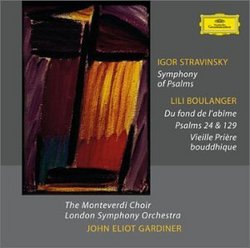| All Artists: Lili Boulanger, Igor Stravinsky, John Eliot Gardiner, Sally Bruce-Payne, London Symphony Orchestra, Julian Podger Title: Igor Stravinsky: Symphony of Psalms/Lili Boulanger: Du fond de l'abime;Psalms 24 & 129; Vieille Priere bouddhique Members Wishing: 0 Total Copies: 0 Label: Deutsche Grammophon Release Date: 9/10/2002 Genre: Classical Styles: Opera & Classical Vocal, Historical Periods, Modern, 20th, & 21st Century, Symphonies Number of Discs: 1 SwapaCD Credits: 1 UPC: 028946378922 |
Search - Lili Boulanger, Igor Stravinsky, John Eliot Gardiner :: Igor Stravinsky: Symphony of Psalms/Lili Boulanger: Du fond de l'abime;Psalms 24 & 129; Vieille Priere bouddhique
CD DetailsSimilar CDs |
CD ReviewsA revelation andrew john raiskums | Melbourne, Australia | 03/10/2003 (5 out of 5 stars) "Reviews I've seen of this CD have praised the Stravinsky performance and rightly so, since it's a clean, punchy, and insightful reading of one of Stravinsky's most important choral works. But it's the Boulanger pieces on this disc that really grabbed me. Why had I not heard this amazing music before? I learned there have been recordings of Boulanger's Psalm settings around. Igor Markevitch's pioneering recording from the 50's, supervised by Lili's sister, Nadia, has been in and out of the catalogue since it was released. (BBC Legends have recently brought out recordings from the '60's that were conducted by Nadia) Then, in the early '90's a disc on the Timpani label appeared, followed a few years later by Yan Pascal Tortelier's award-winning disc on Chandos. John Eliot Gardiner's new disc surely eclipses all these- his orchestra is the London Symphony, who play with great flare and commitment and his choir are the Monteverdi Choir, who respond ardently to the music, and their French is excellent. I won't dwell on the sad details of Lili's life but suffice is to say that at 19 she won the Prix de Rome and these Psalms were written during her year-long stay at the Villa Medici, in 1916. She died less than three years later, from Crohn's disease. What struck me first was how different the three Psalm settings are. Psalm 24, scored for chorus, brass, timpani, organ and harp, is short and fanfare-like, with the use of parallel fifths giving the music a quasi-medieval feel. A solo tenor is highlighted in the languid middle section which forms a beautiful contrast to the outer sections. The coda works to a powerful climax with the women's voices finally coming to prominence. Psalm 129 also brings the men's voices to the fore, particularly the baritones, whose upward-arching lines give the music great expressive impact. Here we discover how sophisticated Lili's sense of harmony is; chords made up of fourths and fifths predominate but the harmonic movement in this music is always sure and strong, one of its most satisfying features. The coda of this Psalm is especially beautiful, with once again, the women's voices entering for the first time but here in wordless vocalise, creating a gentle halo of sound. Psalm 130 is by far the longest of the three. That this music was written by a 23 year old is astonishing; it seems to describe a whole life experience. There is an amazing passage for the violins not far from the start that sounds as if it were modelled on the Prelude to Act III of Tristan, but making comparisons to other composers is really not useful in describing this music- there is so much originality in it. The climaxes, involving the full weight of the orchestra, are riveting, the gradual movevment towards acceptance and light as satisyingly worked out as say, one of Bruckner's slow movements. For me this music is a revelation and I hope this disc does something to bring it wider audience. And I can't imagine more persuasive performances of these scores than John Eliot Gardiner's." Superb Symphony of Psalms! jonsj | New York, NY United States | 10/23/2002 (5 out of 5 stars) "I'm going to restrict my review just to the Stravinsky Symphony of Psalms. I think Gardiner has done a wonderful job here. Incisive, exciting conducting, making the most of the score's spare orchestration and spikey rhythms. The chorus sings *beautifully* and emotionally (yes the combo of Gardiner and Stravinsky has produced an emotional performance!) The chorus's ethereal, pure sound in the closing Alleluias is haunting perfection. Compared to the recent recordings of Craft and Boulez, and classics by Ancerl, Bernstein, and Stravinsky himself, I'm inclined to rate this one at the top." From the Depths to the Heights: Great Settings of the Psalms jonsj | 05/26/2004 (5 out of 5 stars) "Here are some remarkable compositions by a remarkable composer who died at 24--certainly an incalculable loss for the world of music. Winning, apparently to no one's surprise, the Prix de Rome, the precocious Lili Boulanger, not yet 20, went off to Rome to compose three Psalm settings included on this disc, all in 1916, her 23rd year. They are by no means cut from the same cloth. Psalm 24 is very short and declamatory, with prominent brass as befits a song that begins "The earth is the Lord's and the fullness thereof." Psalm 129, which laments the afflictions of Israel, is a more subdued work, with a quiet melismatic conclusion on the single word "Ah!" that recalls the wordless chorus in Holst's "Uranus" from The Planets, written about the same time. Any connection? Almost certainly not--chalk it up to the "great minds think alike" phenomenon. The much longer Psalm 130 is an extended dramatic cantata based on the famous cry from the depths: "De profundis clamavi ad te Domine." The dark, indeed "profound," effects that Boulanger draws from the orchestra and chorus--concentrating on the low end of the spectrum with grumbling double basses and rolling timpani--mark her as a master colorist. Out of this bleak welter swells a contralto solo, pleading for forgiveness above limpid arpeggios from the orchestra (including the limpid sounds of the harp). Other soloists join in the prayer, interrupted now and again by the chorus still crying from the depths. The opposition is dramatic and highly effective. Though this work is slow in pace, its 27-minute duration seems much less. Fascinating stuff beautifully performed by John Eliot Gardiner's own Monteverdi Choir and the London Symphony.The Symphony of Psalms is the perfect discmate for Boulanger's music. Boulanger's music may be late romantic and Stravinsky's neoclassical, but both composers produce a highly individualistic approach to the Psalms and to musical praise of God in general, sharing a brooding darkness that is typically Russian (Boulanger's mother was Russian). There are a number of fine recordings of the Symphony in the catalog; Gardiner turns in a performance that can rival most of them, I think. I remember Stravinsky's own recording with fondness; it has a special power others are hard pressed to match. But of course Gardiner has far superior sound: unlike recent recordings from DG, and despite the fact that this is a studio recording, there is a convincing hall ambience, plus a naturalness of balance that is commendable. This is a must-have disc for lovers of 20th-century choral music and should help to rekindle a well-deserved interest in the music of Boulanger."
|


 Track Listings (7) - Disc #1
Track Listings (7) - Disc #1
